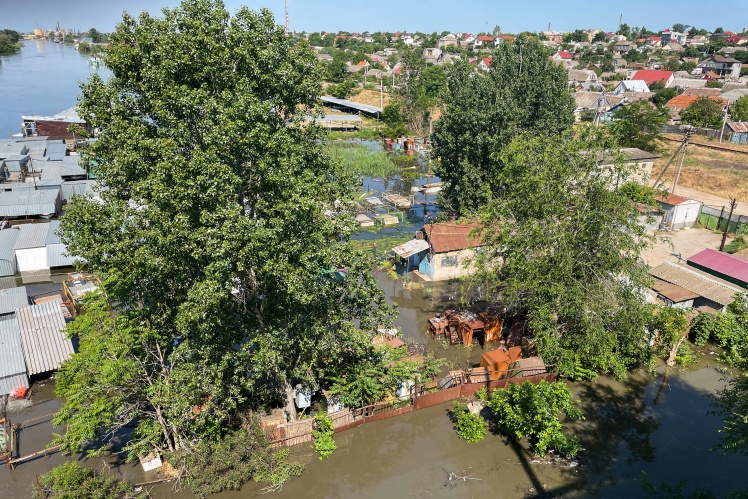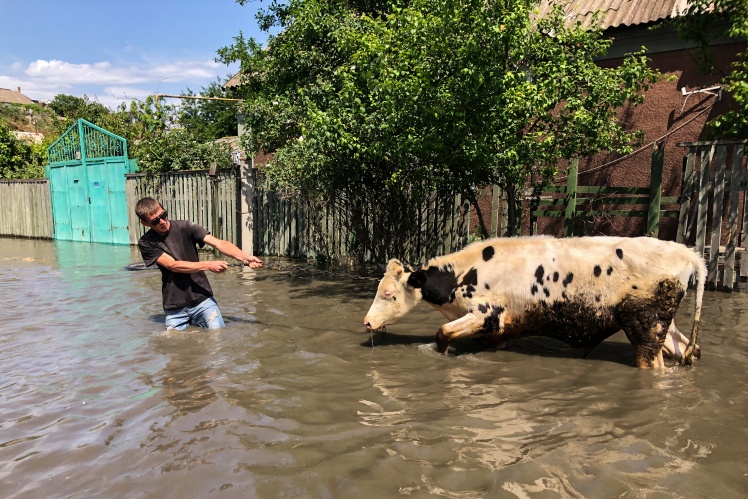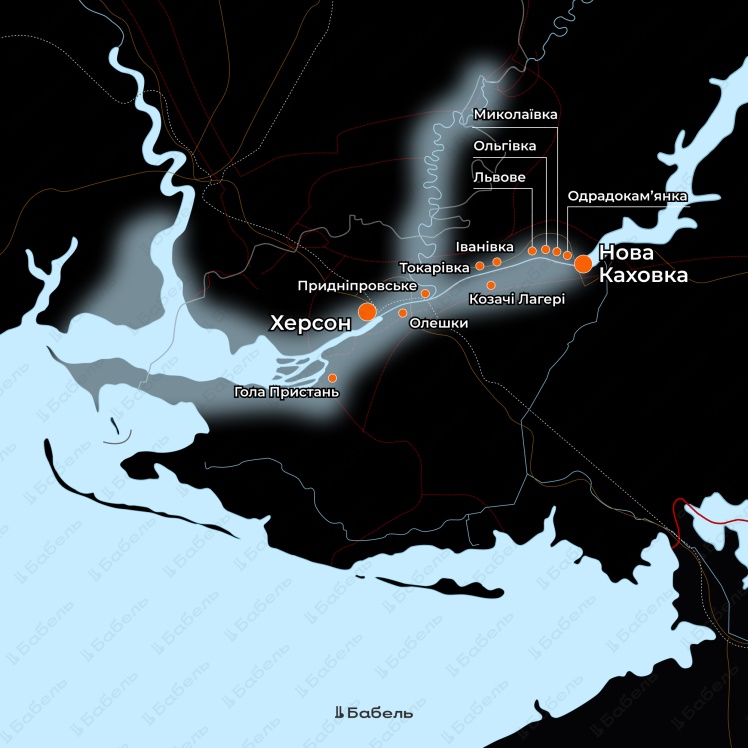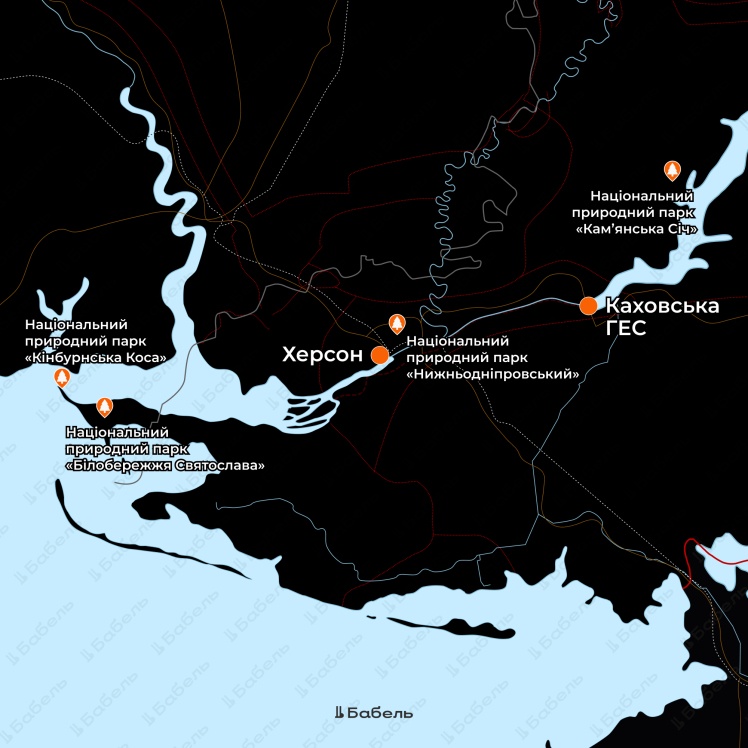What will happen to the ZNPP? Will it explode?
So far, ZNPP is not in danger, explains Oleksandr Kharchenko, director of the Ukrainian Energy Research Center. The cooling pools are full, thereʼs even more water than usual. But the water evaporates in the summer, so now there are 4-5 weeks to decide how to fill them further, says the expert. Technically, this is possible — after the water level stabilizes, a pipe can be laid to the Dnipro through which water can be pumped into the pools with pumps. It would have been easy to do in peacetime, but now the ZNPP is occupied by the Russians, all the shores are mined and Ukraine has no physical access to them. In addition, shelling continues.
Will the demolition of the hydroelectric power station affect the energy supply?
No. Since the occupation, the Kakhovka HPP has not supplied electricity either to the territories free from the Russians or to the occupied territories. Therefore, the accident at the hydroelectric power station does not affect the amount of electricity in Ukraine in any way.
What are the threats posed by the destruction of the Kakhovka HPP?
The scale of the problem will be clear soon, Oleksandr Kharchenko says, when the water level stabilizes. But it is already clear that cities and enterprises located on the shores of the Kakhovka Reservoir may be left without water. These are Nikopol, Kryvyi Rih, Marganets and other settlements. The water level will drop, and it will be impossible to fill the water intakes of Nikopol and Kryvyi Rih, says Kharchenko. And this is a threat to hundreds of thousands of people.
What will happen to the fields and harvest?
In settlements that are now under water, mostly vegetables were grown: tomatoes, cucumbers, peppers, potatoes. In one season, farmers received two harvests: an early one at the end of spring — early summer, and the second in autumn, after planting in June — July. That is, because of the explosion, Ukraine lost both the first and second harvests, Oleksandr Syniuk, a representative of the public organization Zemlya Tavria, which works with local farmers, told Babel. "But the grain is not affected — it is mostly grown further from the river," he adds.
Did we lose the crop just this year or is it for years?
Itʼs not clear yet. "Ukrhydroenergo" says that in four days the water from the reservoir should drain. Then, perhaps, it will be absorbed by the sands of the left-bank Kherson region, and the ten-kilometer zone around the riverbed will be restored. And already next summer it will be possible to plant vegetables. But those settlements located directly near the Dnipro, and the crops harvested there, may be lost for years.
Farms on the left bank, which is currently occupied, will suffer the most. Oleksandr Syniuk says that the water has flooded greenhouses, agricultural land, homesteads there. Even when the water level drops, the groundwater level will remain high. That is, this land will be unsuitable for growing vegetables. On the right bank, everything is more optimistic, Syniuk adds. Villages near the river will be affected, but there are not many farms there. The water will recede, and there will be no further threat to the crop.
Will the water destroy the defenses of the Russian military, which they built on the left bank of the Dnipro?
Water has a great destructive power. Therefore, the system of engineering barriers and fortifications of the occupiers near the Dnipro riverbed was flooded. But as an active military engineer, who is currently at the front, explains to Babel, it is too early to say how destroyed they are. This must be seen and studied, and the Ukrainian military does not have such an opportunity.
And what will happen to minefields?
They are washed away with water, and this is very dangerous. Explosive and non-explosive barriers are moved, covered with mud, so it will be difficult to find and demine them after de-occupation.
Flooding on the first day after the explosion of the Kakhovka HPP dam. Not only people, but also animals become victims of floods.
Getty Images / «Babel'»
Does the detonation hinder the offensive of the Ukrainian military?
Destroying any dam makes it difficult for troops to maneuver, so this blast is no exception. But as the commander of the Ukrainian United Forces, Serhiy Naev, said, the flooding caused by the detonation of the hydroelectric power station will not hinder the offensive of the Ukrainian military.
Perhaps, on the contrary, it will become easier to advance higher up the Dnipro, where the water level will drop?
Hardly so. Approaches and exits must always be taken into account when crossing a water obstacle. When the water recedes, muddy sections of the river open up, which are difficult to navigate. History repeats itself — in 1941, Russian Chekists blew up the dam of the Dnipro HPP to stop the German advance. The Germans restored the station already in the summer of the following year, and in the fall of 1943, during the retreat, they again tried to blow it up.
What will happen to the ecosystem of the Kakhovka Reservoir and the Dnipro River?
Blowing up a hydroelectric power plant is an environmental disaster. The scale of the impact is still difficult to estimate, but it will be large and devastating. Without water, fish, clams, crustaceans and microorganisms can die in the Kakhovka reservoir, and the decomposition of dead organisms will affect the quality of the water. Animals that live in flooded areas and plants can die. This especially threatens the population of rodents, in particular endemic species and those listed in the Red Book of Ukraine, says the environmental human rights organization "Ecology. Rights. Human".
A deer rescued from the water.
The undermining of the dam also threatens three Ukrainian national natural parks — Nizhnyodniprovskyi, Kamyanska Sich, and Svyatoslav White Coast — and the Black Sea Biosphere Reserve, which is protected by UNESCO. The landscape park "Kinburnska Kosa" can be flooded. These territories have the status of wetlands of international importance, they are protected by the Ramsar Convention and the Bern Convention.
Map of flooded settlements of Kherson region. National natural parks that are at risk of flooding.
«Babel'»
And what about the Crimean Channel?
The Crimean Channel has already begun to flow. But the Russians have collected enough water in reservoirs, so in the near future there will be enough water in Crimea.
Will the detonation of the HPP affect the Black Sea?
Unfortunately yes. First of all, this refers to toxic substances that enter the water due to the fact that settlements, warehouses and industrial facilities were flooded. Downstream areas can also become contaminated with toxic substances.
And what to do with it now?
Campaign manager Oleh Savytsky from the non-governmental organization Razom we stand says that undermining the hydroelectric power plant can be a reason for new sanctions against Russia. For example, countries will stop buying Russian fossil fuels, including liquefied natural gas and refined petroleum products.
Is it possible to be held accountable for undermining the HPP?
Yes. According to the Geneva Conventions and additional protocols to them, during the war, the parties must take into account the environmental situation and, if possible, minimize the impact on the environment. Separately, the Geneva Conventions prohibit the destruction of dams, and violation of this norm is a war crime, equivalent to the use of weapons of mass destruction. If it becomes clear that the order to blow up the dam was given by the military or political leadership of Russia, the International Criminal Court may take up such a crime.
In addition to criminal liability, Ukraine can also demand separate compensation and reparations from Russia for the damage Russia has caused to the environment by undermining the hydroelectric power plant. As the lawyer Natalya Gutarevych explained to Babel, there have already been such precedents in history. Although, says Gutarevych, the practice of this issue is long and difficult. "There are quite a lot of wars and conflicts between states, but the environmental aspect of the consequences of such actions is only beginning to be seriously considered as a basis for compensation," Gutarevych notes.
The emergency meeting of the National Security and Defense Council of Ukraine, which took place on Thursday morning due to the Russiansʼ detonation of the dam in Nova Kakhovka.
Getty Images / «Babel'»
Translated from Ukrainian by Anton Semyzhenko.




